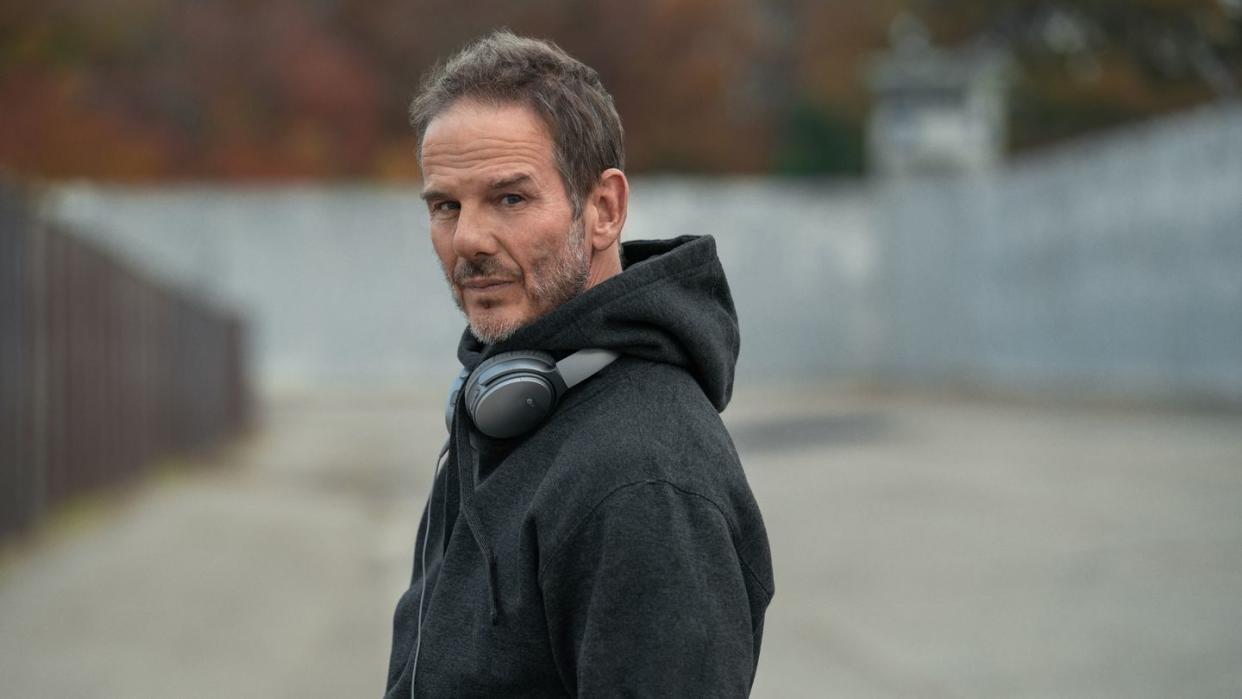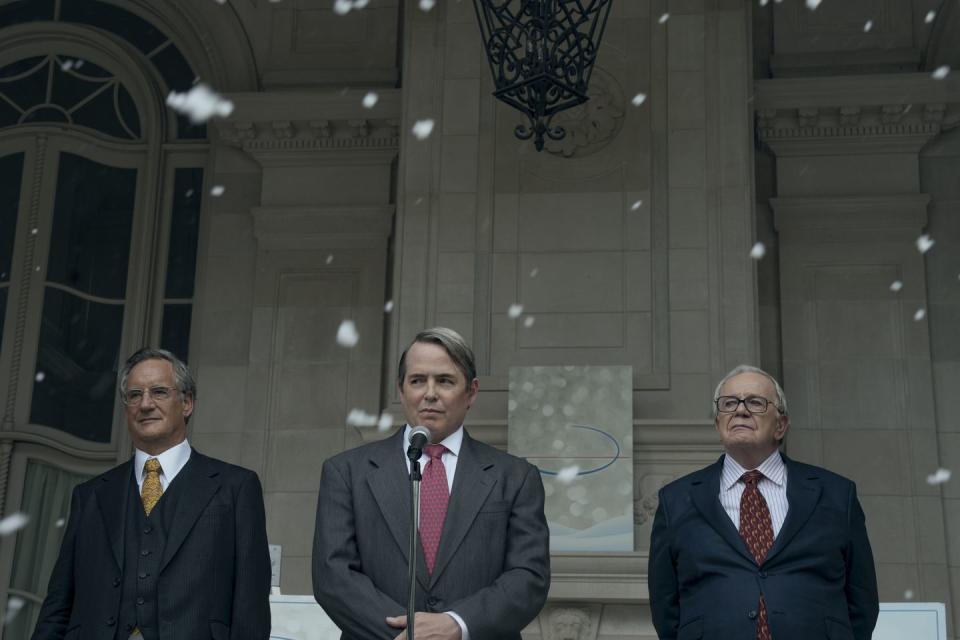Pete Berg's Americana Is Becoming Something Else

- Oops!Something went wrong.Please try again later.
- Oops!Something went wrong.Please try again later.
- Oops!Something went wrong.Please try again later.
- Oops!Something went wrong.Please try again later.
"Hearst Magazines and Yahoo may earn commission or revenue on some items through these links."
This interview was conducted before the SAG-AFTRA strike.
“I did OxyContin once, recreationally,” Pete Berg says. “Someone asked me if I wanted to try it. I’ll try pretty much anything once, and I remember the feeling I had was that I was being slowly dropped into a warm tub of honey.”
It’s always intriguing to see how a filmmaker depicts the experience of being on drugs, and I’d asked how Berg made his choices while directing Painkiller—a new, six-episode Netflix series, streaming today—which tracks the opioid that changed everything in this country.
“It felt incredible,” he continues, “and afterwards, I'm like, Yeah, I'm not going near that again. The drug works. I’ve never done heroin, but I've heard that it's comparable. OxyContin in our show is that warm honey bath.”
Berg asks if I’d ever tried it. I say opiates are one thing I’ve tried to avoid, even if I was once presented with a large bottle of pills on the occasion of having a couple wisdom teeth pulled. That’s a version of the story that afflicts Glen Kryger (played by Taylor Kitsch), a mechanic who runs his own business until he falls at work, damages his back, and starts taking Oxycontin for the pain. You probably have an idea of what comes next, considering how emblematic this path to addiction has become in the broader epidemic. Yet the rendering here from Kitsch still feels raw and visceral—a horror in slow motion.
Kryger is the kind of all-American everyman Berg has depicted across a successful directorial career, which ignited with a cinematic adaptation of Friday Night Lights. Berg executive-produced the NBC series of the same name that became a cultural phenomenon. Kitsch’s Tim Riggins came to practice from a broken home where alcohol flooded into the gaps, playing fullback in a town clinging to a high-school football team for hope in boom-or-bust America. For Berg, it was a sign of things to come.
Before Friday Night Nights, he dabbled in black comedy (Very Bad Things) and action-comedy (The Rundown). Afterwards, it was an alt-superhero movie (Hancock) and the celebrity-laden Battleship, and a series of films—frequently featuring Kitsch and Mark Wahlberg—that reflect a particular post-9/11 Americana: 2007’s The Kingdom, in which American agents go into Saudi Arabia to track down a terror cell; 2013’s Lone Survivor, which sees a Navy SEAL team ambushed by Taliban fighters in Afghanistan; and 2016’s Patriots Day, built around a police sergeant on the day of the Boston Marathon attacks. In all of them, brave men make sacrifices for their country at a time when so much of our national energy was devoted to striking back against those who hit us.
Berg is a few minutes late for our Zoom, having just woken up after a long day on set out West. He asks if he looks OK—his hair is standing up on end, bed-headed—but I assure him this story is just about the words. The 59-year-old is lean and pretty spry, but he’d been up late and his dome told the tale. He mentions what he was doing on the road when I ask why he was so drawn to nonfiction storytelling as a director.

“To take something that really happened and unpack it, it gets me going creatively,” he says. “I'm in New Mexico making a film about America in 1857, in this very specific part of the country where Brigham Young was trying to make his last stand. The U.S. army was trying to get him out, and several Native tribes were all being squeezed. To be able to take that factual reality and then add a little bit of fiction, it just gives me a better anchor and I'm able to function at a better creative level.”
It’s all a long way from Berg’s birthplace in New York City and his time growing up in Chappaqua, a Westchester suburb. But there came a point in his career where he seemed to see the American South and West as a great sprawling canvas for telling our particular national stories—particularly true ones. By 2018, he’d developed an interest in another kind of American everyman, the one laid low by corporate recklessness and greed. In Deepwater Horizon, Mark Wahlberg plays a technician on an oil rig offshore of Louisiana who was one of many nearly killed—others were less lucky—through the reckless disregard of mid-level managers from BP.
Painkiller moves up the corporate food chain, a necessity when Arthur and Richard Sackler are involved. The feedback between uncle and nephew are core to Painkiller, which draws heavily on Patrick Radden Keefe’s story in The New Yorker, “Empire of Pain,” and Barry Maier’s Pain Killer. Richard Sackler built the modern Purdue Pharma, supercharging sales of Oxycontin with a relentless promotional campaign aimed at doctors. It was carried out by, as Uzo Aduba’s Edie puts it in the show, “little hot aliens [who] invaded rural America.” But it was Arthur who reimagined the pharmaceutical company as an advertising agency.
“He was the first doctor that I know of to say, ‘Wait a minute, we've got these really great products,’” Berg says. “Let's treat them like televisions or cars or shoes.” The elder Sackler started out doing lobotomies. “Just a bizarre way to make a living, right?” He continues, “You're driving a pick into someone's frontal cortex.” But that was a one-and-done business. He was looking for repeat customers, and so he got into lithium. “He called it a lobotomy in a bottle,” Berg adds. “I find it hard to understand how you cannot look at a guy like that as a really distorted, somewhat psychotic capitalist.”
But Arthur Sackler is long dead for most of the events in Painkiller, and after a brief scrum amongst the many Sackler heirs—who are depicted throughout as bumbling narcissists pathologically obsessed with money—it’s Richard who takes the reins. He begins the process of “throwing heroin in M&Ms candy coating,” as Berg puts it. Then there are the promotional campaigns fronted by hot young people and the cult-like sales culture that comes to define Purdue Pharma as an enterprise. Berg and his writing team sought to capture that element through the company’s corporate retreats in Florida, and they got hold of some actual footage from those events to guide them in constructing a dark and twisted bacchanalia.

“When I looked at the videos of these sales conferences and these Purdue reps just getting wasted and going into these awful hotel conference rooms and partying all night, it all felt diabolical and absurdist and kind of scary,” Berg said. “I can't imagine that was not a very creepy event to go to. I kind of wish I went to one.” It’s the kind of thing that happens all over the country every day, hosted by firms that in some cases are as large and profitable as Purdue was in the Oxy heyday. “They have a right to have a corporate retreat in Florida and have everybody drinking and singing, and if people want to have sex, great,” Berg said. “The problem is, the product was heroin.”
At the center of all this is Richard Sackler, played by Matthew Broderick as a kind of quotidian monster hiding behind a boyish innocence, a small man stuck in a big empty house with a big brawny bull mastiff named Unch. Getting information on Richard was the most challenging part of the research process, Berg reported: “He's done as great of an internet scrub as anyone I've ever seen.” But one moment in that search also provided a breakthrough in understanding the nature of the greater beast. “We got an ex-Purdue employee, a woman who was one of Richard Sackler’s, like, five secretaries, to FaceTime us for about 2 hours,” Berg said. “She was in her car, and she pulled over onto the side of the road and it was all somewhat nefarious. She was scared. And even this woman who was trying to give us more insight into Richard was very limited because he was so deeply private. But I think the most telling part of that call was that she was still scared to talk about the Sacklers.”
Watch the Trailer for Painkiller
It was Richard who, in Painkiller’s telling, led the strong-arming of the Food and Drug Administration to win OxyContin’s approval, a stunning passage of events that lays bare how weak the FDA as an institution really is. In the end, it came down to one point of failure—Curtis Wright, who led review of the drug and later got on the Purdue payroll. He wasn’t the only one to flip sides, and Berg points out that two big lawyers involved in the eventual litigation around Oxycontin—Mary Jo White, who repped Purdue, and John Brownlee, the U.S. Attorney who went after them—are now on opposite sides of the NFL’s sexual harassment investigation into Washington Commanders owner Dan Snyder. White worked to shield the Sacklers, but now “she's the voice of protecting the innocent, because that's where the money is.” Brownlee is working for Snyder. “Nothing matters,” Berg says. “People can get away with anything.”
He was resigned, at times, to the nature of the problem. “When you're dealing with an issue like greed, good luck,” he responds, when I bring up regulating how pharmaceuticals are advertised. “It's very hard to legislate human greed.” He thinks you just need to take into account someone’s motives—even a doctor’s—when they suggest introducing something to your or your family’s lives. But Berg does get worked up about the FDA, and the politico types who can manipulate agencies like these—and the aftermath of an event like the Deepwater Horizon disaster—to cover their asses. It’s the culmination of his move over the last half-decade towards looking less outward and more inward in his examinations of 21st-century American life. His filmmaking repertoire was really put to the test, though, by a catastrophe that was quiet—no explosions, but no less destructive.
“It was an event, right? All of these deaths, all of this money, something really violent has occurred,” Berg says. “It's a different type of violence, but it's a violent event. It's not so much that I'm interested in attacking capitalism or corporate greed. Fair enough. Corporate greed should be checked. But it's more like, just as a filmmaker, I like unpacking events. And the opioid crisis is one hell of an event.”
He’s back to something potentially more explosive in American Primeval, the Western epic he’d just woke up from working on when we spoke. It’s another limited series, a format he relishes. “You get to go deeper than you do on a film. You get to shoot them like you'd be shooting a film. There's nothing like Painkiller or American Primeval that would come out today theatrically. It's just not the way the theatrical market is working.” He’ll partner with Kitsch once more on Primeval, one of the actors he consistently trusts to work hard and give a shit while depicting an American everyman who does the same. More than ever, though, Berg has an eye on the powerful interests changing the trajectories of such lives from behind a corporate or bureaucratic logo.
In the case of the Sacklers and Purdue Pharma, his eyes are wide open: “They were no different from street drug dealers,” Berg says. “They were just FDA approved.”
You Might Also Like

